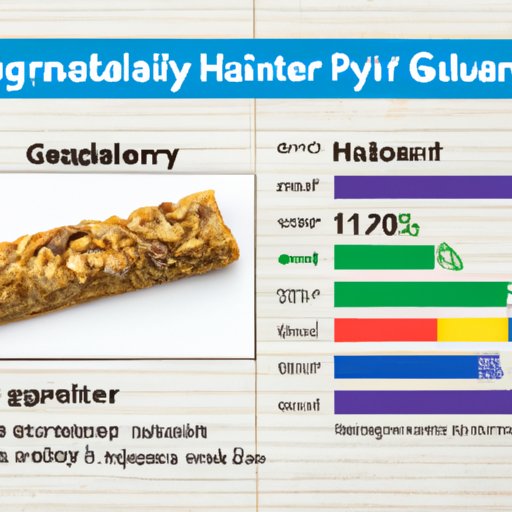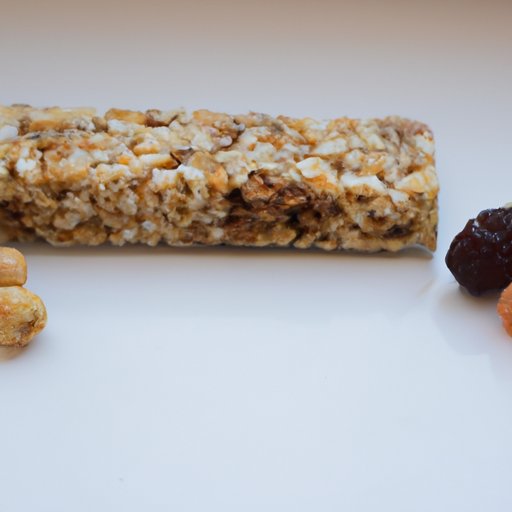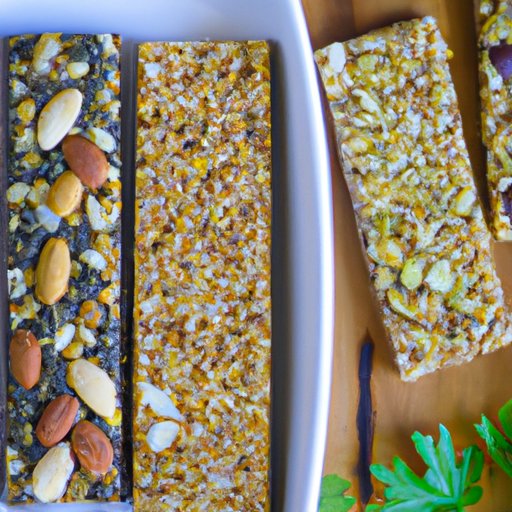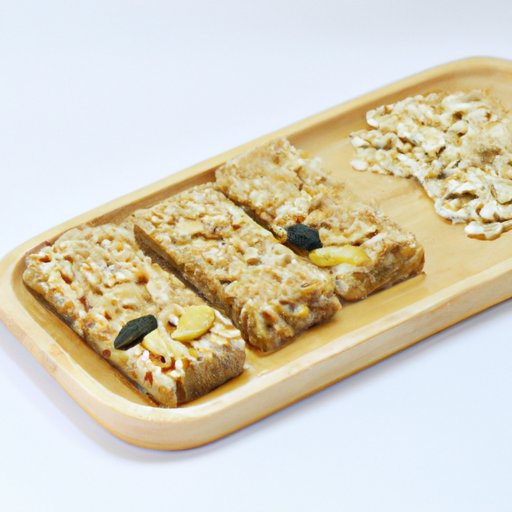Introduction
Granola bars are a popular snack that is often seen as a healthier alternative to candy bars or other processed snacks. But are they really good for you? This article will explore the health benefits and risks associated with eating granola bars. We’ll take a comprehensive look at their nutritional value and examine the pros and cons of using them as a snack. We’ll also discuss healthier alternatives for snacking and how to make smarter choices.

A Comprehensive Look at the Nutritional Value of Granola Bars
Granola bars are typically made up of oats, nuts, dried fruit, and honey or other sweeteners. They can vary widely in terms of ingredients and nutritional value, so it’s important to read labels carefully when selecting a bar. In general, granola bars are high in calories, fat, sugar, and carbohydrates, but they can also be a good source of protein, fiber, vitamins, and minerals.
In terms of calories, most granola bars range from 200 to 300 calories per bar. The fat content ranges from 3 to 10 grams per bar, depending on the type of nut or seed used. Granola bars can also be high in sugar, with some containing up to 20 grams of added sugar per bar. On the plus side, many granola bars are a good source of protein and fiber, ranging from 5 to 8 grams of each per bar.
When compared to other snacks, granola bars do have some advantages. For example, a single-serving bag of chips may contain around 160 calories and 10 grams of fat, while a granola bar will usually have fewer calories and less fat. However, it’s important to note that many granola bars are still high in sugar, so it’s best to opt for varieties with no added sugars or artificial sweeteners.
Pros and Cons of Eating Granola Bars as a Snack
Granola bars have several advantages over other snacks. For starters, they’re convenient and portable, making them an easy option for on-the-go snacking. Many granola bars are also a good source of energy, providing a steady release of carbohydrates throughout the day. Additionally, some granola bars are fortified with vitamins and minerals, which can help fill any gaps in your diet.
However, there are some drawbacks to eating granola bars as a snack. Many varieties are high in sugar and contain artificial flavors, colors, and preservatives. Some also contain unhealthy trans fats, which can raise cholesterol levels and increase the risk of heart disease. Additionally, eating too many granola bars can lead to weight gain due to their high calorie and sugar content.
Exploring the Health Benefits and Risks of Granola Bars
Although there are some potential drawbacks to eating granola bars, there are also some potential health benefits. Studies have found that eating a moderate amount of granola bars can help lower cholesterol levels and reduce the risk of heart disease. One study published in the American Journal of Clinical Nutrition found that eating a daily serving of whole grain oats was associated with a lower risk of cardiovascular disease.
On the other hand, eating too many granola bars can lead to weight gain. This is due to their high calorie and sugar content, which can cause blood sugar levels to spike. Additionally, some granola bars contain unhealthy trans fats, which can raise cholesterol levels and increase the risk of heart disease.

The Role of Granola Bars in a Balanced Diet
Granola bars can be part of a balanced diet, but moderation is key. If you’re going to eat granola bars, try to opt for varieties with no added sugars or artificial sweeteners. Additionally, look for bars that are low in calories, fat, and sugar and high in protein, fiber, and essential vitamins and minerals.
It’s also important to remember that granola bars should not replace healthy meals or snacks. Instead, use them as an occasional treat to supplement a balanced diet. Try to limit your intake to one or two bars per day and balance out the rest of your meals and snacks with nutrient-dense foods like fruits, vegetables, and lean proteins.

Healthier Alternatives to Granola Bars for Snacking
If you’re looking for a healthier alternative to granola bars, there are plenty of options. Nuts and seeds are packed with protein and healthy fats, and they can provide a quick and convenient snack on the go. Fruits and vegetables are also excellent sources of vitamins, minerals, and antioxidants, and they can provide a satisfying crunch without the added sugar.
Whole grain breads and cereals are another great option. Many brands offer single-serving packages that are low in calories and sugar and high in fiber, making them an ideal snack. And if you’re really craving something sweet, opt for natural options like fresh or dried fruit or dark chocolate.
Conclusion
In conclusion, granola bars can be part of a balanced diet, but moderation is key. While they may offer some health benefits, they can also be high in calories, fat, and sugar. To make sure you’re getting the most out of your snack, opt for varieties with no added sugars or artificial sweeteners. Additionally, consider trying healthier alternatives such as nuts, fruits, and whole grains for a more nutritious snack.
(Note: Is this article not meeting your expectations? Do you have knowledge or insights to share? Unlock new opportunities and expand your reach by joining our authors team. Click Registration to join us and share your expertise with our readers.)
